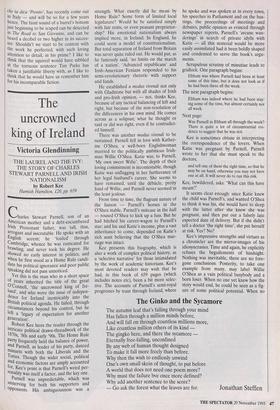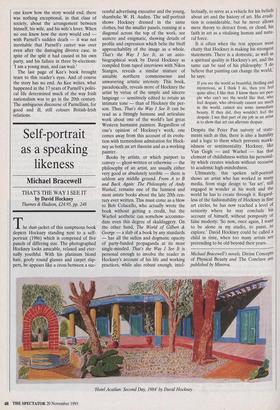The uncrowned king of Ireland
Victoria Glendinning
THE LAUREL AND THE IVY: THE STORY OF CHARLES STEWART PARNELL AND IRISH NATIONALISM
by Robert Kee Hamish Hamilton, f20, pp. 659 Charles Stewart Parnell, son of an American mother and a debt-encumbered Irish Protestant father, was tall, thin, arrogant and inscrutable. He spoke with an English accent; he 'loafed' through Cambridge, whence he was rusticated for brawling, and never took his degree. He showed no early interest in politics, and When he first stood as a Home Rule candi- date his political ignorance and poor public Speaking did not pass unnoticed. Yet this is the man who in a short space of years inherited the title of the great 0 Connell, 'the uncrowned king of Ire- land', and who wove the issue of indepen- dence for Ireland inextricably into the British political agenda. He failed, through circumstances beyond his control, but he left a 'legacy of expectation for another generation'.
Robert Kee lures the reader through the intricate political drawn-threadwork of the 1870s, '80s and early '90s. The Home Rule Party frequently held the balance of power, and Parnell, as leader of his party, danced Minuets with both the Liberals and the Tortes. Though the wider social, political and economic factors are amply accounted for, Kee's point is that Pamell's weird per- sonality was itself a factor, and the key one. Parnell was unpredictable, which was unnerving for both his supporters and °Prionents. His ambiguousness was a
strength. What exactly did he mean by Home Rule? Some form of limited local legislature? Would he be satisfied simply with fair rents, or even peasant proprietor- ship? His emotional nationalism always implied more, in Ireland. In England, he could seem a model of constitutionalism. But total separation of Ireland from Britain was never quite ruled out. He would put, as he famously said, `no limits on the march of a nation'. 'Advanced republicans' and Irish-American Fenians responded to his semi-revolutionary rhetoric with support and funds.
He established a modus vivendi not only with Gladstone but with all shades of Irish and pro-Irish opinion, — not, thinks Kee, because of any tactical balancing of left and right, but because of the non-resolution of the differences in his own mind. He comes across as a solipsist; what he thought or said or did was right, even if he contradict- ed himself.
There was another modus vivendi to be sustained. Parnell fell in love with Kather- ine O'Shea, a well-born Englishwoman married to the politically ambitious Irish- man Willie O'Shea. Katie was, to Parnell, `My own sweet Wifie'. The depth of their loving commitment is incontestable, though Katie was unflagging in her furtherance of her legal husband's career. She seems to have remained, until the debacle, pretty fond of Willie, and Parnell never seemed in the least jealous.
From time to time, the flagrant nature of the liaison — Parnell's horses in the O'Shea stable, Parnell's suitcase in the hall — roused O'Shea to kick up a fuss. But he had hitched his career-wagon to Parnell's star; and his and Katie's income, plus a vast inheritance to come, depended on Katie's rich aunt believing that the O'Shea mar- riage was intact.
Kee presents this biography, which is also a work of complex political history, as a 'selective narrative' for those intimidated by the work of academic historians. Kee's most devoted readers may wish that he had, in this book of 659 pages (which includes notes etc), been a bit more selec- tive. The accounts of Parnell's semi-royal progresses by train through Ireland, where he spoke and was spoken at in every town, his speeches in Parliament and on the hus- tings, the proceedings of meetings and debates, public opinion as evinced through newspaper reports, Parnell's 'arcane wan- derings' in search of private idylls with Katie — all this material would be more easily assimilated had it been boldly shaped and condensed to serve the book's argu- ments.
Scrupulous scrutiny of minutiae leads to gridlock. One paragraph begins:
Eltham was where Parnell had been at least some of this time, but it does not look as if he had been there all the week.
The next paragraph begins:
Eltham was indeed where he had been stay- ing some of the time, but almost certainly not all week.
Next page:
Was Parnell in Eltham all through the week? There is quite a lot of circumstantial evi- dence to suggest that he was not.
Kee is sometimes obtuse in interpreting the correspondence of the lovers. When Katie was pregnant by Parnell, Parnell wrote to her that she must speak to the doctors,
and tell one of them the right time, so that he may be on hand, otherwise you may not have one at all. It will never do to run this risk.
Kee, bewildered, asks: 'What can this have meant?'
It seems clear enough: since Katie knew the child was Parnell's, and wanted O'Shea to think it was his, she would have to sleep with the latter after she knew she was pregnant, and then put out a falsely late expected date of delivery. But if she didn't tell a doctor 'the right time', she put herself at risk, Yes? No?
Kee's impressive strengths and virtues as a chronicler are the mirror-images of his idiosyncrasies. Time and again, he explicitly refuses the beguilements of hindsight. Nothing was inevitable, there are no fore- gone conclusions. Posterity, to take one example from many, may label Willie O'Shea as a vain political busybody and a born loser. When no one yet knew how the story would end, he could be seen as a fig- ure of some political potential. When no one knew how the story would end, there was nothing exceptional, in that class of society, about the arrangement between himself, his wife, and his wife's lover. When no one knew how the story would end with Parnell's sudden death — it was not inevitable that Parnell's career was over even after the damaging divorce case, in spite of the split it had caused in his own party, and his failure in three by-elections: `I am a young man, and can wait.'
The last page of Kee's book brought tears to this reader's eyes. And of course the story has no end. As Kee writes, what happened in the 17 years of Parnell's politi- cal life determined much of the way Irish nationalism was to go in the 20th century. The ambiguous discourse of Parnellism, for good and ill, still colours British-Irish relations.











































































 Previous page
Previous page